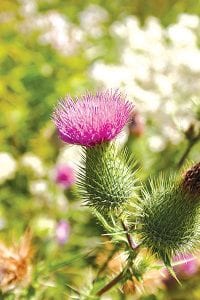Invasive species – plants not natural to this area that aggressively displace indigenous plants – affect human health, economics, and forest ecology, according to Angelique Edgerton, invasive species coordinator with the Cook County Invasive Team. Invasive plants are present in Cook County, and to help people learn how to control them, several workshops are being held in August.
The workshops will be held Tuesday, August 13 at 5:30 p.m. at the Beaver Bay Community Center; Wednesday, August 14 at 5:30 p.m. at the Cook County Community Center in Grand Marais; and Thursday, August 15 at 6:30 p.m. at the Hovland Town Hall. Participation is free of charge and refreshments and snacks will be provided.
Canada thistle, common tansy, and spotted knapweed are three invasive species plaguing this area. The workshops will help people learn how to identify these and other invasive species and what kinds of treatment methods will control them. Different treatments are recommended for different species and range from pulling or cutting to spraying or wiping with herbicides. The workshops will also cover what to do with an area once invasive plants have been removed. “Planting trees and shrubs can help reclaim the site,” Edgerton said. “One way to improve tree root growth and increase tree survival, as well as successfully extend the planting season into late summer and early fall, is through the use of gravel beds. We will explain how to create gravel beds and discuss their benefits and applications.”
More information on the workshops can be found online at sugarloafnorthshore.org. For further information or to register, contact Angelique Edgerton with the Cook County Invasive Team at (218)387-3772 or Mike Reichenbach with University of Minnesota Extension at (218)726-6470.
The workshops are being funded in part by a grant from the National Fish & Wildlife Foundation and are being presented by the Cook County Invasive Team, University of Minnesota Extension, and Sugarloaf: The North Shore Stewardship Association.



Loading Comments